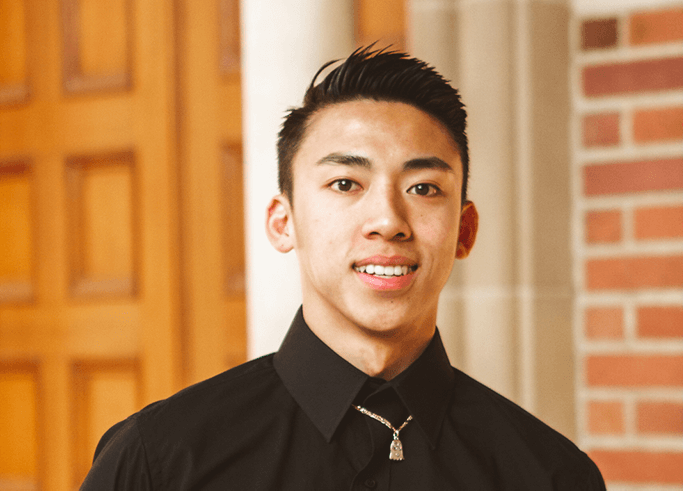Jonathan Tsai, a sophomore double majoring in Music History & Industry and English, recently received the prestigious Pacific Bridge Arts Scholarship. This award is given to Asian Americans, Native Hawaiians, and Pacific Islanders (AANHPIs) pursuing degrees in the musical arts. As part of the scholarship, Tsai will be paired with industry leaders and professionals for mentorship. Historically, AANHPIs have been underrepresented in mainstream American popular music, and this scholarship aims to provide a network of support and community for AANHPIs talent.
We connected with Tsai for a Q&A to discuss the award and his thoughts on Asian Americans in the music industry.
● Why did you decide to study music and what encouraged you to apply for the Pacific Bridge Arts Scholarship?
The funny thing is, I got into UCLA as an English major because I didn’t know where I’d fit in academically in the music school at UCLA. I wasn’t necessarily an instrumentalist, and I wasn’t necessarily trying to be classically trained in voice. That’s why I applied as an English major.
Then a year in, I heard from a bunch of friends that there was going to be a new major called Music History & Industry, and I literally freaked out because it was the perfect Hail Mary major I was looking for. It just happened to be the perfect fit for me. I’m a songwriter, I write music, and I try to produce and record music whenever I can. So, I applied, joined, and now I’m double majoring in both.
I found out about the Pacific Bridge Arts Scholarship through an email from Emily Spitz. Immediately after, I realized I fit the description of the scholarship perfectly. I’m Asian, I’m trying to get into the music industry, I’m majoring in the field of music, and I’m at UCLA. I checked off all of the boxes and thought, “I guess I’ll apply.” And, that’s what I did.
● What does it mean to you personally to be selected as a recipient of the Pacific Bridge Arts Scholarship?
When you turn on the radio, you rarely hear any Asians in pop music —with the exception of K-pop. I feel in the western music scene, there hasn’t really been space for Asians and there hasn’t really been a lot of space opened up for Asians.
Which has been unfortunate because growing up I didn’t see anyone on TV or anyone singing at concerts or events that looked like me or accurately represented my identity. It feels kind of scary walking into this especially as an Asian and having an identity that seems out of place.
But at the same time, it is encouraging because as you try to enter this music scene as an Asian person, it is very powerful to know that there is an entire organization backing you.
● Why do you feel programs like the Pacific Bridge Arts Scholarship are important and how can they help expand Asian American representation in the arts and creative fields?
I think they’re really important because for a lot of Asian Americans there are some people who believe you should pursue a different career other than music.
For example, when I told my parents I wanted to do music there was a lot of: “Are you sure you really want to do this? Is this a safe option? It would be much better if you chose a more stable major at UCLA, and UCLA being a good school you would have a good job coming out of that.”
And, being a Music History & Industry major and an English major I hear: “You’re going to have a hard time” and “You’re going to struggle through this.”
I went into that with this underlying fear. Am I ever going to find a job? Am I ever going to succeed in this? It is really uncertain, especially for someone that is like me. However, knowing that there are organizations like Pacific Bridge Arts that are encouraging Asian people and Pacific Islanders to go into music, and willing to back them up financially, along with mentorship and resources is very comforting. It feels good to have a community within the music industry.
● Is there anything additional you would like to share or add?
For whoever else, any other Asians out there that are considering music as a major and are kind of scared. I feel like you have to go into it headfirst and just step into this world not knowing what to expect because at the same time you don’t not know what good things are going to come out of it. I would have never expected in a million years to get this scholarship, or to release a single, or do any of these things. It’s kind of shocking.
Due to Tsai’s tenacity to push forward and continue to pursue his career in music, last December he released his debut studio single “Boy Bi.” The song currently has over two million plays on Spotify and was selected for East Meets West’s curated playlist. The studio and acoustic versions of “Boy Bi” are available on all streaming platforms.
We are thrilled to have Tsai as part of our program, and grateful to have his perspective represented for the Asian community at the School of Music. This is UCLA music.
Note: The interview has been edited for clarity and length.


